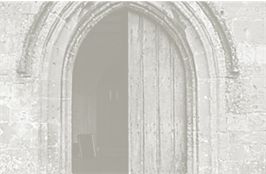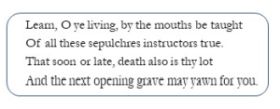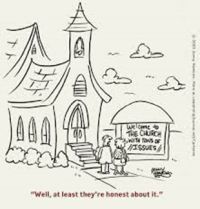 Get out your bible and try to cook your way through this puzzle!
Get out your bible and try to cook your way through this puzzle! Minister’s Letter (2023)
DUST OFF YOUR BIBLES ……..
and BAKE a SCRIPTURE CAKE this ADVENT
Rather than a typical list of ingredients, the recipe for a Scripture Cake has a list of Bible verses instead. The baker needs to look up references in the Old Testament (Authorized Version, or to have a very good knowledge of scripture!)
Other names for the Scripture Cake include ‘Bible Cake’, ‘Scriptural Cake’ and ‘Old Testament Cake’. The earliest recipe dates back to the late 17th century, and in the nineteenth century the cake became very popular both in Britain and in America. It was often used as a way to teach young girls in Sunday School both baking skills and Bible verses. Bible cakes became regular contributions to church and chapel teas, picnics and Sunday School days out.
 Get out your bible and try to cook your way through this puzzle!
Get out your bible and try to cook your way through this puzzle!
AN ADVENT PRAYER
 Lord, in this season of Advent, inspire us to be people of hope.
Lord, in this season of Advent, inspire us to be people of hope.
Encourage us not to be greedy for material possessions, but for justice and truth.
Enflame us with a love for others, which crosses boundaries of race, religion and nationality.
Stir within us a desire to fight for the integrity of creation and appreciate the immense beauty of the earth.
Be with us, Lord, at this time, that we may be a people of hope. Amen. (Susy Brouard, CAFOD)
Scripture Cake Cheat Sheet
225g Judges 5:25 last clause = softened butter
225g Jeremiah 6:20 = light brown sugar
1 tablespoon 1 Samuel 14:25 = honey
3 Jeremiah 17:11 = eggs lightly beaten
225g 1 Samuel 30:12 = raisins
175g Nahum 3:12 = soft-dried figs or dates
85g Numbers 17:8 = blanched almonds, roughly chopped
350g 1 Kings 4:22 = plain flour
1 teaspoon 2 Chronicles 9:9 = ground mix spice
1 teaspoon Amos 4:5 = baking powder (leaven)
A pinch of Leviticus 2:13 = salt
6 tablespoons Judges 4:19 = milk
November
How long, O Lord?
 Has your heart been breaking as you’ve heard the news about the conflict between Israel and Palestine? My emotions have been buffeted between shock and horror, anger, and deep deep sadness as I imagine the utter fear of the people at that music festival in Kibbutz Re’im, as I hear on the radio the pain of parents who had just been told that their son was among the dead, as I see those pictures of tower blocks reduced to rubble and as I wonder whether there will even be an end to it.
Has your heart been breaking as you’ve heard the news about the conflict between Israel and Palestine? My emotions have been buffeted between shock and horror, anger, and deep deep sadness as I imagine the utter fear of the people at that music festival in Kibbutz Re’im, as I hear on the radio the pain of parents who had just been told that their son was among the dead, as I see those pictures of tower blocks reduced to rubble and as I wonder whether there will even be an end to it.
 Perhaps by the time you read this, a fragile peace may have been restored. But at the time of writing, the violence just seems to escalate, and each fresh atrocity on either side seems to simply fuel it further. I long for world leaders to say ‘stop – there is just no future in this’, for people to be prepared to really listen to one another’s grievances, and for wise and able diplomats to broker a different, more peaceful way forward.
Perhaps by the time you read this, a fragile peace may have been restored. But at the time of writing, the violence just seems to escalate, and each fresh atrocity on either side seems to simply fuel it further. I long for world leaders to say ‘stop – there is just no future in this’, for people to be prepared to really listen to one another’s grievances, and for wise and able diplomats to broker a different, more peaceful way forward.
I think it is the barbarity of it that distresses me most. There seems to be no limit to the cruelty that we can inflict on one another, and at times we seem to have such scant regard for the preciousness of human life.
Perhaps it has particularly struck me it seems in such contrast to other things I have heard or seen this week, things where life has been treated as precious, something to be handled carefully and with respect.
 Like the person telling me of the way in which her husband had been treated with such care and compassion, and afforded such dignity whilst dying in a local hospice, and of the difference that this had made to him and his family.
Like the person telling me of the way in which her husband had been treated with such care and compassion, and afforded such dignity whilst dying in a local hospice, and of the difference that this had made to him and his family.
Or whilst visiting an elderly gentleman with dementia, how I witnessed the kind and respectful way in which the live in carers interacted with him. Or the joy of a great grandmother as she proudly showed me the photo of a new baby born just that day.

 I have felt privileged to hear of and meet people who seemed to realise the preciousness of each and every life, and were doing what they could to honour that life and treat it with the reverence that it deserved. There may be limits to what most of us can do about the conflict between Israel and Palestine, but perhaps if we could all take this approach with those we meet, the world might be a better, warmer and more peaceful place.
I have felt privileged to hear of and meet people who seemed to realise the preciousness of each and every life, and were doing what they could to honour that life and treat it with the reverence that it deserved. There may be limits to what most of us can do about the conflict between Israel and Palestine, but perhaps if we could all take this approach with those we meet, the world might be a better, warmer and more peaceful place.
October
SEEKING GOD IN THE ORDINARY
I hate housework! But the ordinary things of life can be seen in a different light .…… On the rare occasions I pick up a duster and manoeuver a vacuum cleaner, a poem by the sixteenth century poet George Herbert often springs to mind. It’s called ‘The Elixir’ [which the dictionary defines as “a substance held to be capable of changing base metals into gold” – alchemists in the sixteenth century searched avidly for this substance hence Herbert’s use of the image]. Herbert puts forward the idea that if you do something ‘for God’s sake’ it is, as it were, ‘turned to gold.
Teach me, my God and King,
In all things Thee to see,
And what I do in anything
To do it as for Thee.
A man that looks on glass,
On it may stay his eye;
Or if he pleaseth, through it pass,
And then the heav'n espy.
All may of Thee partake:
Nothing can be so mean,
Which with his tincture—"for Thy sake"—
Will not grow bright and clean.
A servant with this clause
Makes drudgery divine:
Who sweeps a room as for Thy laws,
Makes that and th' action fine.
This is the famous stone
That turneth all to gold;
For that which God doth touch and own
Cannot for less be told.
As the poem is also used as a hymn, which I’ve sung many times, the words spin through my head and make me think maybe I should try vacuuming the room “for Thy laws”. Then I recall a book given to me at my Confirmation ‘The Practice of The Presence of God’. It’s a collection of ‘conversations’ with a monk called Brother Lawrence, and of letters he wrote,
Brother Lawrence was born around 1610 in Herimenil, Lorraine, a Duchy of France. From an early age he was drawn to a spiritual life of faith and love for God. At mid-life he entered a newly established monastery in Paris where he became the cook for the community which grew to over one hundred members. One of the ‘conversations’ records that “in his business in the kitchen (to which he had naturally a great aversion), having accustomed himself do everything there for the love of God and asking for His grace to do his work well, he had found everything easy during the fifteen years that he had been employed there …... since he tried to please God by doing little things for the love of Him in any work he did.”
Whether in the kitchen, wielding a duster, or mowing the grass, we too might find everything ‘easy’ and transformed if we could do it “for God’s sake” and use the time for what brother Lawrence describes as “a continual conversation with Him, in freedom and simplicity.”
Penny Wood LLMSeptember
Encourage One Another
 September 12th is National Encouragement Day – probably not a lot of people know that!
September 12th is National Encouragement Day – probably not a lot of people know that!
At a recent Home Group study, we looked at Barnabas, a follower of Jesus. He was originally named Joseph, but the Apostles gave him the nick-name Barnabas, which means ‘Son of Encouragement’ or ‘Son of Consolation’.
After Jesus’ resurrection, the early Christians shared everything they had. One encouraging thing Barnabas did was to sell a field he owned and give the money to the Apostles to use to help any needy people among the believers.
After St Paul was converted on the road to Damascus, Barnabas introduced him to the Apostles. They were naturally frightened of Paul who had been vehemently persecuting Christians and they couldn’t believe he was a changed man. However, Barnabas encouraged them to accept Paul by telling them how Paul had been preaching boldly in the name of Jesus.
 Barnabas and Paul spent a whole year in Antioch encouraging and building up the newly established church there. On various missionary journeys Barnabas was an encouraging companion to Paul.
Barnabas and Paul spent a whole year in Antioch encouraging and building up the newly established church there. On various missionary journeys Barnabas was an encouraging companion to Paul.
When church leaders in Jerusalem were debating whether Gentile believers should be made to adopt Jewish customs, Barnabas and Paul spoke up in favour of the Gentile Christians. They thought that things should not be made too difficult for them. The leaders then decided not to impose too many restrictions on Gentiles who came to faith in Jesus.
St Luke records that Barnabas was ‘a good man, full of the Holy Spirit and faith, and many people were brought to the Lord’ (Acts 11.24). Legend claims that Barnabas was martyred at Salamis (the principal city of ancient Cyprus) in 61. ‘Son of Encouragement’ – what a great nickname and epitaph to have!
The word translated encouragement in the New Testament is used to describe giving comfort, but it also involves urging, strengthening, giving courage. Throughout the Bible there are instructions to encourage one another, eg 1 Thessalonians 5:11:
‘Encourage one another and help one another, just as you are now doing.’
 The right words can help reinvigorate us, strengthen us for what lies ahead, and remind us to keep trying. Encouragement lifts us up when we are down or feel we have failed. It can be like a gentle push forward when we’ve run out of steam. Without encouragement, we can easily become dejected or overwhelmed.
The right words can help reinvigorate us, strengthen us for what lies ahead, and remind us to keep trying. Encouragement lifts us up when we are down or feel we have failed. It can be like a gentle push forward when we’ve run out of steam. Without encouragement, we can easily become dejected or overwhelmed.
Encouragement is free. It doesn’t cost anything to say a few pleasant words to someone. Even a smile or saying hello to a stranger could make a difference to them. Of course, encouragement should not be hollow or patronising, but sincere and heartfelt, using words that build up rather than put people down.
‘Pleasant words are like a honeycomb, sweetness to the soul and health to the body.’
Proverbs 16:24
 Let every day be a day of encouragement, not just September 12th. Say a cheery word, or a word of praise, or send a card or call or text someone who may be feeling down or struggling. Sincerely say thank you at every opportunity.
Let every day be a day of encouragement, not just September 12th. Say a cheery word, or a word of praise, or send a card or call or text someone who may be feeling down or struggling. Sincerely say thank you at every opportunity.
And let’s pause to give thanks for people who have been an encouragement to us in our journey through life.
Liz Welters, Associate Minister
August
Do you enjoy church?
An article by Revd Sarah Lawrence

 As a minister, part of me thinks people should enjoy church; we put enough work into making it engaging and stimulating. I think of the late nights preparing sermons with interesting stories and funny analogies. When I am preparing a service, I think carefully to make sure it engages people on different levels.
As a minister, part of me thinks people should enjoy church; we put enough work into making it engaging and stimulating. I think of the late nights preparing sermons with interesting stories and funny analogies. When I am preparing a service, I think carefully to make sure it engages people on different levels.
But then I stop for a moment and ask myself, do I enjoy church? It may seem like an odd question: I am a priest, of course I do! But if I’m honest, my experiences of churchgoing have had highs and lows with much monotony and routine in between. The truth is, I don’t go to enjoy myself; I go because there is something deep inside me compelled to seek God, something which has been bitten by the bug of knowing him. Most of the time I guess my churchgoing is pretty unremarkable, it’s not often that I come away deeply moved or elated, or even disturbed or challenged. But it happens enough to keep me coming, keep me seeking.
C S Lewis talks of a sense of being drawn by these glimpses of something beyond. His book The Pilgrim’s Regress follows the spiritual quest of John, compelled to leave his stifling home in search of something better. He is drawn by a sense of longing he experienced as a child when he glimpsed a far-away island. It made him realise that there is something beyond the narrow confines of the life he had known. This glimpse of the divine is what keeps drawing me back to church.
 I have had glimpses of the divine in charismatic services, carried away in worship, speaking in tongues, hands in the air; and I have had these glimpses kneeling before the blessed sacrament in silent
contemplation, as the scent of incense wafts by and spirals up to heaven. But the outward things are not where joy is found. These same outward things can seem profound and beautiful to one person at one time, yet at another they can appear ridiculous or boring. Ultimately the thing that really matters in church, encountering God, is something which only comes from God. The Spirit is not a caged bird, she comes and goes at will, all we can do is open to her.
I have had glimpses of the divine in charismatic services, carried away in worship, speaking in tongues, hands in the air; and I have had these glimpses kneeling before the blessed sacrament in silent
contemplation, as the scent of incense wafts by and spirals up to heaven. But the outward things are not where joy is found. These same outward things can seem profound and beautiful to one person at one time, yet at another they can appear ridiculous or boring. Ultimately the thing that really matters in church, encountering God, is something which only comes from God. The Spirit is not a caged bird, she comes and goes at will, all we can do is open to her.
 People may come to church if they enjoy it and for that it is worth all those late nights and careful thought to make services engaging. But it is only the deep joy of encountering God which will really draw people from the heart to seek him. People may love church services, they may hate them, they may be bored by them, but ultimately they will keep coming because the heart that seeks God will seek everywhere and anywhere.
People may come to church if they enjoy it and for that it is worth all those late nights and careful thought to make services engaging. But it is only the deep joy of encountering God which will really draw people from the heart to seek him. People may love church services, they may hate them, they may be bored by them, but ultimately they will keep coming because the heart that seeks God will seek everywhere and anywhere.
This is an edited article from magnet magazine (www.ourmagnet.co.uk) which was published in The Sign in 2019.
A Prayer by Bishop Thomas Ken (1637-1711)
 O God, make the door of this Church wide enough
O God, make the door of this Church wide enough
to receive all who need human love and fellowship,
and a heavenly Father’s care;
and narrow enough to shut out
all envy, pride and hate.
Make its threshold smooth enough
to be no stumbling-block to children,
or to straying feet,
but rugged enough
to turn back the tempter’s power:
make it a gateway to thine eternal kingdom.
Amen
July
Courageous Advocacy – Really?
 Every five years or so, Finmere and Fringford Primary Schools, along with other Church of England Primary Schools, have a SIAMS inspection. SIAMS stands for Statutory Inspection of Anglican and Methodist Schools, and it is designed to assess the impact of the school’s Christian vision on all that it does. In recent years, the inspection framework has been revised twice, in 2018 and in 2023, and 2018 saw the introduction of a new term: courageous advocacy. I don’t know what images that evokes for you, but my mind is filled with Emily Wilding Davison throwing herself in front of the King’s horse at the Epsom Derby in 1913. Or supporters of the ‘Just Stop Oil’ gluing themselves to significant paintings in the National Gallery in 2022. climate protesters people sticking themselves to the M25. Or Greta Thunberg absenting herself from school as a call for more action against climate change. Certainly courageous acts of advocacy, but I am not entirely sure that these are the sort of actions the SIAMS inspectors have in mind!
Every five years or so, Finmere and Fringford Primary Schools, along with other Church of England Primary Schools, have a SIAMS inspection. SIAMS stands for Statutory Inspection of Anglican and Methodist Schools, and it is designed to assess the impact of the school’s Christian vision on all that it does. In recent years, the inspection framework has been revised twice, in 2018 and in 2023, and 2018 saw the introduction of a new term: courageous advocacy. I don’t know what images that evokes for you, but my mind is filled with Emily Wilding Davison throwing herself in front of the King’s horse at the Epsom Derby in 1913. Or supporters of the ‘Just Stop Oil’ gluing themselves to significant paintings in the National Gallery in 2022. climate protesters people sticking themselves to the M25. Or Greta Thunberg absenting herself from school as a call for more action against climate change. Certainly courageous acts of advocacy, but I am not entirely sure that these are the sort of actions the SIAMS inspectors have in mind!
Maybe not, but we probably do want our children to be able to speak out against issues of injustice, especially on behalf of those whose voice is not generally heard. We do want them to be informed about issues of injustice in the world, and to be able to move beyond simply knowing to saying and doing. We do want them to be able to become agents of change in the world, bringing about transformations in our communities, both locally and globally.
 In fact, it would be quite good if we as adults were better able to do that too! The problem is that it does require effort on our part if we are to find out about the facts behind an issue, rather than sticking with our often ill-informed opinions. It does require courage on our part if we are to risk speaking out, especially if our opinion does not match that of other people that we meet. And it does require sustained persistence on our part to think of and follow through with actions that will make a difference. Added to which, there are just so many things in the world that need changing. A lot of the time it can feel easier not to bother!
In fact, it would be quite good if we as adults were better able to do that too! The problem is that it does require effort on our part if we are to find out about the facts behind an issue, rather than sticking with our often ill-informed opinions. It does require courage on our part if we are to risk speaking out, especially if our opinion does not match that of other people that we meet. And it does require sustained persistence on our part to think of and follow through with actions that will make a difference. Added to which, there are just so many things in the world that need changing. A lot of the time it can feel easier not to bother!
So what can help us be courageous advocates?
The church communities in Shelswell do a little bit of (fairly timid) advocacy.
 And I also know of individuals who are passionate about other issues such as mental health or supporting refugees.
And I also know of individuals who are passionate about other issues such as mental health or supporting refugees.
I wonder what injustices you see in the world, both locally and globally? What issue do you feel passionately about? Help us to share your passion and celebrate the actions you have taken by writing a short article for the Shelswell News.
Alice GoodallJune
Gravestones - Humorous or Serious
In the last week of April, the Benefice marked ‘Love Your Burial Ground Week’. When I was a Team Vicar, only one of the three churchyards in my patch was open. It was in such a small village that, in seven years, I never did a burial there, only interment of ashes. The other two churchyards were closed, so the new burial grounds were in the care of the Parish Councils. This meant I did not have to grapple with the Diocese of Oxford’s Churchyard Regulations which state that inscriptions on gravestones must be simple, reverent, and theologically acceptable.
Things were not always so. In the past, headstones might be informative, amusing, moving or rather scary.

 The most chilling epitaph I have seen is in the Churchyard of St Mary Magdalene, Upper Winchendon. It is on the headstone of John Page who departed this life on February 22nd 1829, aged 53 years.
The most chilling epitaph I have seen is in the Churchyard of St Mary Magdalene, Upper Winchendon. It is on the headstone of John Page who departed this life on February 22nd 1829, aged 53 years.
You might not want a gravestone, but what would you choose as your epitaph – words which you feel sum you up? What words do you think other people would use?
A verse in the New Testament Book of Romans says, “Do not think of yourself more highly than you ought, but rather think of yourself with sober judgement, in accordance with the faith God has distributed to each of you.” (Romans 12.3) It is hard to have a realistic assessment of ourselves, not to think too highly - or too lowly.
Other people may well see us differently, but only God knows the whole
“The Lord does not look at the things people look at. People look at the outward appearance, but the Lord looks at the heart.” (1 Samuel 16:7)
Lizz Welters, Associate Minister
May
What do you think?
Since the beginning of 2023 I have turned up at at least two churches to take a service only to find, at the appointed ‘start’ time, that no more than one person has arrived. A couple of other times only 3 people arrived. I don’t think I need to take this personally because other members of the Ministry Team report similar experiences. Overall, numbers attending Sunday by Sunday are very small 6 – 8 – 10 …….
Few people today are committed to worship every Sunday. Maybe 20 over the whole of the Shelswell Benefice. Yet every Sunday in the Shelswell Benefice there are four or five services on offer for them to go to. As it’s unlikely the regular attenders will go to church more than once on a Sunday, it means each service is sparsely populated, even if a few of the irregular attenders turn up! Consequently, the worship is friendly but hardly uplifting. It’s inhibiting to have to sing when there are so few people; it can be difficult to find people to help with the preparation of the church, the readings etc., volunteers are few and Ministers feel rather like ‘pressgang masters’ trying to get people to come and participate. The congregation can feel disheartened – a sad ‘remnant’.
Why don’t we just have one service on a Sunday which everyone goes to? [Or at the most, two.] The committed worshippers would benefit from each other’s company, Ministers would benefit from being able to share leading the worship, there would be more chance of offering ‘live’ music and having the support of a choir; we would be strengthened by worshipping together. Any ‘new’ person who might risk putting a toe into the church would not feel so ‘exposed’ as they would do entering a church where there are only 4 or 5 people. Each Sunday the service could be in a different church so that ‘hosting’ responsibilities are shared.
 Is this such a mad suggestion? Well, experience over many years highlights a particular emotional difficulty - the reluctance of many people to worship in any church other than their ‘own’ church. People are willing to drive to hospital appointments, the supermarket, the gym, take their dogs for walks, visit friends, go to the theatre, etc. etc. but going to another church appears to be a step too far. Or is this just a convenient excuse for not worshipping? In which case, these will almost certainly be the people who won’t regularly turn up anyway even to services in their ‘own’ church. So, for the benefit of supporting and building up the committed, and to enable deeper, richer worship, let’s try worshipping together.
Is this such a mad suggestion? Well, experience over many years highlights a particular emotional difficulty - the reluctance of many people to worship in any church other than their ‘own’ church. People are willing to drive to hospital appointments, the supermarket, the gym, take their dogs for walks, visit friends, go to the theatre, etc. etc. but going to another church appears to be a step too far. Or is this just a convenient excuse for not worshipping? In which case, these will almost certainly be the people who won’t regularly turn up anyway even to services in their ‘own’ church. So, for the benefit of supporting and building up the committed, and to enable deeper, richer worship, let’s try worshipping together.
April
Keep the World on its Toes! Geoffrey Lowson is the author of this article from The Sign
 Easter Day is on April 9th this year. The earliest it can be is March 22nd and the latest is April 25th. If you want to know how to calculate when Easter will be, there are some tables in the front of the Book of Common Prayer which are used to work it out, but be prepared to end up with a serious headache.
Easter Day is on April 9th this year. The earliest it can be is March 22nd and the latest is April 25th. If you want to know how to calculate when Easter will be, there are some tables in the front of the Book of Common Prayer which are used to work it out, but be prepared to end up with a serious headache.
Jesus rose from the dead on the day after the Jewish feast of the Passover. At a meeting of Christian leaders in Nicaea in AD 325 (the ‘Council of Nicaea’) it was decided to keep the link between Easter Day and Passover. But the date of the Jewish Passover is governed by the moon hence, because Passover moves, then Easter moves.
In early Christian history it was even more complicated. The Celtic Church had developed a way of calculating the date of Easter which was different from that decided at Nicaea. King Oswy of Northumbria followed the Celtic tradition but his wife, Eanfleda, followed the Roman rule, and as a consequence it is recorded (rather amusingly) that in AD 661, the Queen was fasting and keeping Palm Sunday in one part of the palace whilst the King was celebrating Easter in another part. This resulted in Oswy setting up what has become known as the Synod of Whitby in AD 664, presided over by Hilda (the founding abbess of the monastery at Whitby). The outcome was that the Roman method was adopted for the whole of the country.
It could be argued that in 2023 this is all a bit of a nonsense. Why not just pick a date for Easter each year - say the second Sunday of April? Well, that may well happen one day, but there are some sound arguments for hanging on to the variable date.
 First, the story of Jesus’ crucifixion and resurrection are so very closely linked with the Passover; the whole trial and execution were rushed to get them over with before the Feast of the Passover.
First, the story of Jesus’ crucifixion and resurrection are so very closely linked with the Passover; the whole trial and execution were rushed to get them over with before the Feast of the Passover.
Second, one of the ways the Anglican Church operates is by holding three things in a creative tension; a sort of three-legged stool - the three legs are Scripture, Tradition and Reason. Tradition on its own could mean, ‘we’ve always done it that way’ but with the other two legs there, Tradition it always under scrutiny. Certainly ‘we’ve always done it that way’ would not be my approach, but on big issues which are deeply rooted in the life of the church we do need to think carefully before changing them.
 Third, because it moves, there is a different feel to Easter as compared with Christmas. I know we have eggs and cards etc., but I wonder if we had a fixed date, then would all the razzamatazz we associate with Christmas descend upon Easter too?
Third, because it moves, there is a different feel to Easter as compared with Christmas. I know we have eggs and cards etc., but I wonder if we had a fixed date, then would all the razzamatazz we associate with Christmas descend upon Easter too?
Easter is our greatest Christian Festival. Let’s rejoice in it and keep the rest of the world on its toes by moving it about a bit!!
 Resurrection Light by Annabel Shilson-Thomas (CAFOD)
Resurrection Light by Annabel Shilson-Thomas (CAFOD)
Risen Christ, when darkness overwhelms us, may your dawn beckon.
When fear paralyses us, may your touch release us.
When grief torments us, may your peace enfold us.
When memories haunt us, may your presence heal us.
When justice fails us, may your anger ignite us.
When apathy stagnates us, may your challenge renew us.
When courage leaves us, may your spirit inspire us.
When despair grips us, may your hope restore us.
And when death threatens us, may your resurrection light lead us.
Amen.
March
This Lent I think I’ll focus on
Good News
 The image of the small baby pulled from the rubble of a collapsed building in north-west Syria following the earthquake. The stories of men and women using their bare hands to try and find survivors. People opening their homes to offer a respite from the bitter cold. The UK firefighters with their specialist equipment and their search and rescue dogs assisting with the international aid effort. In the midst of the appalling news of tens of thousands who have lost their lives and the utter devastation wrought by the earthquake, these stories are good news.
The image of the small baby pulled from the rubble of a collapsed building in north-west Syria following the earthquake. The stories of men and women using their bare hands to try and find survivors. People opening their homes to offer a respite from the bitter cold. The UK firefighters with their specialist equipment and their search and rescue dogs assisting with the international aid effort. In the midst of the appalling news of tens of thousands who have lost their lives and the utter devastation wrought by the earthquake, these stories are good news.
 There is just so much awfulness around in the world. I guess there always has been and I suspect there always will be until kingdom come. And it is so easy to be dragged down by it all, to end up focussing on the negatives, to feel without hope. Yet amidst it all, there is always good news.
There is just so much awfulness around in the world. I guess there always has been and I suspect there always will be until kingdom come. And it is so easy to be dragged down by it all, to end up focussing on the negatives, to feel without hope. Yet amidst it all, there is always good news.
I fondly remember visiting
 In the last couple of weeks, I have spoken with
In the last couple of weeks, I have spoken with

 The list could go on and on, as I remember the very many people who give time to help with church and village activities, clean the church, mow the churchyard, look after the clock, serve on the Parish Council, coach others in sport, drive neighbours to hospital appointments, and so on and so on.
The list could go on and on, as I remember the very many people who give time to help with church and village activities, clean the church, mow the churchyard, look after the clock, serve on the Parish Council, coach others in sport, drive neighbours to hospital appointments, and so on and so on.
And many of these do this whilst holding down difficult and demanding jobs, working many more hours than they get paid for, doing their absolute best with very good grace, and going above and beyond to support colleagues.
 I wonder who has been ‘good news’ for you in the last few weeks? And I wonder for whom you have been ‘good news’?
I wonder who has been ‘good news’ for you in the last few weeks? And I wonder for whom you have been ‘good news’?
Let’s give thanks for all that is good news! And maybe focussing on the way that God is blessing us through one another during this season of Lent may help us to be more open to the ultimate Good News, the good news we celebrate at Eastertime.
AliceFebruary
Traditionally, the 40 days of Lent have been a time when Christians fasted, spent time in prayer, studied the Bible or other spiritual books, didn’t eat meat, and examined their consciences with a view to coming closer to God, or perhaps it would be truer to say ‘letting God come closer to them’. But nowadays people give up chocolate, or alcohol, or take up some exercise programme, the aim being, I suppose, to improve personal well-being, or just lose weight.
How about going back to the ‘old ways’ this Lent? Could we risk engaging in one of the old traditions? Could we plan, and commit, to a prayer time, or a Bible reading time (accompanied by some helpful notes which anyone in the Ministry Team could get for you), or follow the Diocese’s ‘Come and See’ programme. What does that last involve? Here’s what the Diocese says:
“ We send you a short email each day, Monday to Saturday. And on Sundays during Lent you receive a short video from Bishop Steven exploring the theme for Come and See that year in a bit more detail. Each email begins with a short passage of text from the Bible. If you've never opened a Bible before, please don't worry, just go with the flow as you settle in to the journey.
There is a separate weekly email for children and families, and separate materials for teachers, and children, youth and family leaders too. Children and schools materials include films from our school chaplains, and access to some of the contemplative practices from our Space Makers toolkit.”
All you need to do is go onto the website: https://www.oxford.anglican.org/come-and-see/ and register.
 If, however, you would rather do some activity together with other people, you might like to join me in the current ‘Big Church Read’ which is a novel Lydia by Paula Gooder [Canon Chancellor at St Paul's Cathedral, London, and New Testament scholar]. You can find out about the Big Church Read on https://thebigchurchread.co.uk But here’s what they say about Lydia.
If, however, you would rather do some activity together with other people, you might like to join me in the current ‘Big Church Read’ which is a novel Lydia by Paula Gooder [Canon Chancellor at St Paul's Cathedral, London, and New Testament scholar]. You can find out about the Big Church Read on https://thebigchurchread.co.uk But here’s what they say about Lydia.
“Journey with Paula Gooder as she tells Lydia’s story – who she was, the life she lived and her first-century faith – and in doing so opens up Paul’s letter to the Philippians, giving a sense of the cultural and historical pressures that shaped Paul’s thinking, and the faith of the early church.
Written in the gripping style of Gerd Theissen’s The Shadow of the Galilean, and similarly rigorously researched, this is a book for everyone and anyone who wants to engage more deeply and imaginatively with Paul’s theology – from one of the UK’s foremost New Testament scholars.”
We would meet in a group to do this. Perhaps on a weekday evening, but dates and venue to be discussed. Unfortunately, the book is not in paperback until October. It can be bought for £12-99, or even cheaper if one searches for second hand copies. If you would like to be part of a group reading and discussing Lydia get in touch with me as soon as possible, so I can see who is interested and we can plan dates and a venue.
We are also offering a series of Lent lectures which will be on four Thursday evenings in Lent starting on Thursday 2nd March. See page 9 for more information. We will have the details of the speakers in next month’s magazine but perhaps you might like to put the dates in your calendar now. Those that have come along to the Lent Lectures previously will know that they have been really interesting and inspirational, and the opportunity to meet and chat with others over supper beforehand is always very good too!
Don’t miss out on the opportunities that Lent brings us.
Penny WoodJanuary
THE PRAYING HANDS
Albrecht Durer was born in the fifteenth century, near Nuremberg one of eighteen children. Albrecht’s father, a goldsmith by profession, worked long hours and took any other odd jobs he could find in his neighbourhood merely to keep food on the table for his family.
Two of the children, Albrecht and Albert were talented artists. They both dreamt of pursuing their talent further, but they knew that their father would never be able to afford to send either of them to Nuremberg to study at the Academy.
So, the two boys worked out a plan. One would work in the nearby mines and support his brother with his earnings whilst the other would attend the academy. When that bother had finished his studies in four years they would swap. Albrecht won the toss of the coin and attended the academy whilst Albert went down into the mines and supported his brother during his studies with his earnings. Albrecht planned to swap in four years, either using income from sales of his artwork to support Albert, or by labouring in the mines.
Albert went down into the mines for the next four years and financed his brother, whose work at the academy was almost an immediate success. Albrecht's etchings, woodcuts, and his oils were often far better than those of most of his professors. By the time he graduated, he was beginning to earn considerable fees for his commissioned works.
After four years the young artist Albrecht returned to his village, ready to pay for his brother’s time at the academy. The Durer family held a festive dinner to celebrate Albrecht's return. After the meal, Albrecht rose to drink a toast to his beloved brother thanking him for the years of sacrifice that had enabled Albrecht to fulfil his ambition. His closing words were, "And now, Albert, blessed brother of mine, now it is your turn. Now you can go to Nuremberg to pursue your dream, and I will take care of you."
 No, brother. I cannot go to Nuremberg. It is too late for me. Look what four years in the mines have done to my hands! No, brother ... for me it is too late." The bones in every finger had been smashed at least once, and were now suffering from arthritis, the thumbs were bent and twisted. It was difficult even to hold the glass toasting his brother, much less make delicate lines on parchment or canvas with a pen or a brush.
No, brother. I cannot go to Nuremberg. It is too late for me. Look what four years in the mines have done to my hands! No, brother ... for me it is too late." The bones in every finger had been smashed at least once, and were now suffering from arthritis, the thumbs were bent and twisted. It was difficult even to hold the glass toasting his brother, much less make delicate lines on parchment or canvas with a pen or a brush.
Albrecht paid homage to his brother for all he had sacrificed and painstakingly sketched his brother's hands with palms together and thin fingers stretched skyward simply calling the drawing “Hands”. The picture shows the crooked thumb and the gnarled hands that could not close due to the abuse the mines had wrought.
The world renamed his tribute of love “The Praying Hands”. This story is an example of unconditional love and grace, and a reminder to us all that no one ever makes it alone, we all need